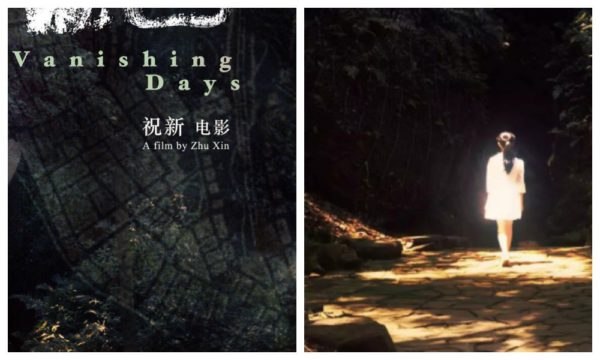China Arts & Entertainment
An Overview of Chinese Nominations at Busan Film Festival (Part I)
These are the Chinese films that have been nominated for the Busan Film Festival.
Published
6 years agoon
By
Gabi Verberg
From Chinese dissident filmmakers to government-funded films, you can find it all at Busan, Asia’s biggest film festival. In the weeks leading up to the event, What’s on Weibo’s Gabi Verberg provides an overview of the Chinese nominees. This week: part I.
On the 4th of October, the 23th Busan International Film Festival in South Korea will roll out its red carpet to open this year’s film festival season in Asia. With the screening of 323 films from 79 countries, it is one of Asia’s biggest international film festivals, with China as one of the main suppliers of films.
Popular sections of the festival include:
– ‘A Window on Asian Cinema’, which showcases new and representative films by Asian filmmakers;
– ‘New Current’, which features the first or the second work by future directors of Asian cinema; and
– ‘Wide Angle‘, an assembly of documentaries, short films, Cinekid, and showcases.
It is these three sections in which most Chinese directors received their nominations.
In the upcoming weeks, we will provide you with more in-depth information on the Chinese films nominated for the festival. Please note that most of these films have not been officially released yet, so it might take some time before the (subtitled) films are available for all audiences.
This week, we will introduce to you to the first five of the Chinese nominees.
1. Savages (Xuěbào 雪暴)

China Mainland
Genre: Drama, Action, Crime, Suspense
Selected in the category: New Currents
Director: Siwei Cui (崔斯韦)
Weibo hashtag: #雪暴# (240.000+ views)
Premiere: October 2018, Busan International Film Festival
Starring: Chen Chang (张震), Nini (倪妮), Fan Liao (廖凡), Jue Huang (黄觉), Hua Liu (刘桦), Guangjie Li (李光洁), Taili Wang (王太利), Xiaojun Yue (岳小军), Yicong Zhang (张弈聪)
About the Director:
Siwei Cui is best known for his successes as a screenwriter. In 2009, he got nominated for best screenplay at the Chinese Film Media Awards, and for best script at the Taipei Golden Horse Film Festival for his work Crazy Racer (疯狂的赛车). Other works he wrote include The Island ( 一出好戏), which is selected in the A Window on Asian Cinema section at this year’s Busan Film Festival, and No Man’s Land (无人区). Siwei Cui once before directed a film in 2013 in cooperation with Zusong Lü (吕祖松) named Piano Trojan (钢琴木马). Savages will be his second work as a director.
Storyline:
Set against the backdrop of a desolate mountain village in the midst of a snow storm, a confrontation between the police and a criminal gang goes down.
Why you should watch it:
It is interesting to see how a relatively unexperienced director assembled so many well-known actors, including Nini (20 million followers on Weibo), Guangjie Li (5.51 million followers on Weibo), Jue Huang (3.73 million followers on Weibo) and Chen Chang (1.69 million followers on Weibo).
2. Vanishing Days (Mànyóu 漫游)

China Mainland
Genre: Drama
Selected in the category: New Currents
Director: Xin Zhu (祝新)
Premiere: October 2018, Busan International Film Festival
Main Characters: Yan Jiang (姜郦), Jing Huang (黄菁), Yan Chen (陈燕), Xiaoxing Li (李小杏), Haiqing Luo (骆海清), Jiehe Lu (卢嘉禾), Jiajun Zhao (赵家俊)
About the Director:
The young director Xin Zhu was born in 1996 and recently graduated from the Film and Television Department of the China Academy of Art. His first short film Community (午山社区) was nominated for an Exploration Award at the Amphibia Youth Film Festival (双栖青年影展). Other works of Xin Zhu are the short films A Folk Song (山野之歌) and Homesick (嘉年华). Vanishing Days is Xin Zhu’s first feature film.
Storyline:
The film is set in a crazy hot summer in 2009. Li Senlin struggles with her essay project, when Aunt Qiuqiu suddenly pays a visit. Reality and memory entangle as her aunt recalls a strange homicide case on a deserted island, while everyone else seems more concerned about the heat.
Why you should watch it:
Xin Zhu is amongst the youngest directors at the Busan Film Festival, and instead of professionals, Xin casted amateur actors for this film. The blog Deep Focus also mentions director Xin Zhu when they talk about the start of ‘a new wave’ of Chinese directors – those born after 1995. Xin Zhu uses an unclear tone to, presumably, let the viewers again experience the feeling of novelty, surprise, and doubt we had when we were younger. The film is full of mismatched stories, dreams and fantasy.
3. A Family Tour (Zìyóu xíng 自由行)

Taiwan/China Mainland/Hong Kong/Singapore/Malaysia
Genre: Drama
Selected in the category: A Window on Asian Cinema
Director: Liang Ying (应亮)
Premiere: 1st August 2018 on Locarno International Film Festival
Main Characters: Zhe Gong (宫哲), An Nai (耐安)
About the Director:
It’s not the first time Liang Ying attends an international film festival. In 2012, he was nominated for a Golden Leopard Award and won an award for best direction at the Locarno International Film Festival for his film When Night Falls (我还有话要说). It is this award-winning film that caused Liang Ying to flee the country after the government allgedly intimidated him and his family members to sell the government the rights of the film. Liang Ying refused, and then continued to live in exile in Hong Kong. A few years later, he won an award at the Taipei Golden Horse Film Festival for his work A Sunny Day (九月二十八日·晴) in the category Best Short Feature Film. Liang Ying’s other famous works include The Other Half (另一半), and Taking Father Home (背鸭子的男孩) – which both received nominations from film festivals worldwide.
Storyline:
The film revolves around Yang Shu, a Chinese director, who has been exiled from Hong Kong for making a film that offended the government. After 5 years, she desperately wants to reunite with her ailing mother who is visiting Taiwan and let her hold the grandson she misses.
Why you should watch it:
The story is semi-biographical from the director’s experiences since his exile from China in 2012. Variety wrote about the film: “[it is an] intelligently affecting story of exile and displacement,” and said it is “Ying Liang’s most highly polished film to date.” Indiewire called the film “heartbreaking.” The film was nominated for the Golden Leopard Award at the 71st Locarno International Film Festival.
4. The Enigma of Arrival (Dǐdá zhī mí 抵达之谜)

Mainland China
Genre: Crime
Selected in the category: A Window on Asian Cinema
Director: Song Wen (宋文)
Reads on Weibo: 35000 (#抵达之谜#)
Premiere: October 2018, Busan International Film Festival
Starring: Xian Li (李现), Borui Dong (董博睿), Xuan Gu (顾璇)
About the Director:
Some might know director Song Wen as the founder of FIRST International Film Festival, a festival for young directors, which celebrated its 12th edition this year. In 2015 Song Wen started his career as a producer and director. The Enigma of Arrival is his first work.
Storyline:
After many years, a group of high school friends reunites. They have not seen each other since the disappearance of Dondong, a girl they all secretly fancied. The circumstances of her disappearance cause the end of their friendship. Although a long time has passed, there are still things unspoken about what exactly happened during those crucial years.
Why you should watch it:
The main character in the film is played by the popular young actor Xian Li (李现), who currently has over 3.8 million followers on Weibo. He is best known for his roles in Chinese TV dramas such as Medical Examiner Dr. Qin. The second reason to watch this film is the contribution of Berlin Film Festival and The Golden Rooster award-winning producer Fei Xie (谢飞). He and Song Wen have been closely cooperating for this work for over three years.
5. Jinpa (Zhuàng Sǐle Yī Zhǐ Yáng 撞死了一只羊)

China Mainland
Genre: Drama
Selected in the category: A Window on Asian Cinema
Director: Pema Tseden (万玛才旦)
Weibo Reads: 340.000 (#撞死了一只羊#)
Premiere: 4th September 2018, Venice International Film Festival
Leading Actors: Jinpa (金巴), Genden Phuntsok (更登彭措), Sonam Wangmo (索朗旺姆)
About the Director:
Pema Tseden is an acknowledged director, screenwriter, producer and writer from Tibet. He started his career as a writer and started publishing stories in 1991. In the years that followed he published more than forty short stories in Tibetan and Chinese. His writing has been acknowledged with many awards. In 2002. he first entered the film industry as editor of the film The Silent Holy Stone (静静的嘛呢石) which received international attention. This is where Pema Tseden’s film career took off. His famous other works include The Search (寻找智美更登) and Tharlo (塔洛) which both received several nominations from in and outside China.
Storyline:
On a dusty highroad in Tibet, a truck-driver gives a young man a ride. As he chats with the hitchhiker, he notices a knife strapped to his leg…
Why you should watch it:
The film is an adaption of the short story Killer (杀手) by Cirenluobo (次仁罗布), and from a short story of the director himself. They are both rewarded writers from Tibet who give a rare glimpse into the lives of the Tibet people. Jinpa was shortlisted for this year’s 75th Venice International Film Festival in the Orizzonti section.
Stayed tuned for more! Meanwhile, also check out our must-see Chinese film list of 2017 here.
By Gabi Verberg
Follow @whatsonweibo
Spotted a mistake or want to add something? Please let us know in comments below or email us.
©2018 Whatsonweibo. All rights reserved. Do not reproduce our content without permission – you can contact us at info@whatsonweibo.com.
Gabi Verberg is a Business graduate from the University of Amsterdam who has worked and studied in Shanghai and Beijing. She now lives in Amsterdam and works as a part-time translator, with a particular interest in Chinese modern culture and politics.

China Arts & Entertainment
“Old Bull Eating Young Grass”: 86-Year-Old Chinese Painter Fan Zeng Marries 36-Year-Old Xu Meng
Online reactions to the news of Fan’s marriage to Xu Meng, his fourth wife, reveal that the renowned artist is not particularly well-liked among Chinese netizens.
Published
1 week agoon
April 18, 2024
The recent marriage announcement of the renowned Chinese calligrapher/painter Fan Zeng and Xu Meng, a Beijing TV presenter 50 years his junior, has sparked online discussions about the life and work of the esteemed Chinese artist. Some netizens think Fan lacks the integrity expected of a Chinese scholar-artist.
Recently, the marriage of a 86-year-old Chinese painter to his bride, who is half a century younger, has stirred conversations on Chinese social media.
The story revolves around renowned Chinese artist, calligrapher, and scholar Fan Zeng (范曾, 1938) and his new spouse, Xu Meng (徐萌, 1988). On April 10, Fan announced their marriage through an online post accompanied by a picture.
In the picture, Fan is seen working on his announcement in calligraphic form.

Fan Zeng announces his marriage on Chinese social media.
In his writing, Zeng shares that the passing of his late wife, three years ago, left him heartbroken, and a minor stroke also hindered his work. He expresses gratitude for Xu Meng’s care, which he says led to his physical and mental recovery. Zeng concludes by expressing hope for “everlasting harmony” in their marriage.
Fan Zeng is a calligrapher and poet, but he is primarily recognized as a contemporary master of traditional Chinese painting. Growing up in a well-known literary family, his journey in art began at a young age. Fan studied under renowned mentors at the Academy of Fine Arts in Beijing, including Wu Zuoren, Li Keran, Jiang Zhaohe, and Li Kuchan.
Fan gained global acclaim for his simple yet vibrant painting style. He resided in France, showcased his work in numerous exhibitions worldwide, and his pieces were auctioned at Sotheby’s and Christie’s in the 1980s.[1] One of Fan’s works, depicting spirit guardian Zhong Kui (钟馗), was sold for over 6 million yuan (828,000 USD).

Zhong Kui in works by Fan Zeng.
In his later years, Fan Zeng transitioned to academia, serving as a lecturer at Nankai University in Tianjin. At the age of 63, he assumed the role of head of the Nankai University Museum of Antiquities, as well as holding various other positions from doctoral supervisor to honorary dean.
By now, Fan’s work has already become part of China’s twentieth-century art history. Renowned contemporary scholar Qian Zhongshu once remarked that Fan “excelled all in artistic quality, painting people beyond mere physicality.”
A questionable “role model”
Fan’s third wife passed away in 2021. Later, he got to know Xu Meng, a presenter at China Traffic Broadcasting. Allegedly, shortly after they met, he gifted her a Ferrari, sparking the beginning of their relationship.

A photo of Xu and her Hermes Birkin 25 bag has also been making the rounds on social media, fueling rumors that she is only in it for the money (the bag costs more than 180,000 yuan / nearly 25,000 USD).
On Weibo, reactions to the news of Fan’s marriage to Xu Meng, his fourth wife, reveal that the renowned artist is not particularly well-liked among netizens. Despite Fan’s reputation as a prominent philanthropist, many perceive his recent marriage as yet another instance of his lack of integrity and shamelessness.

Fan Zeng and Xu Meng. Image via Weibo.
One popular blogger (@好时代见证记录者) sarcastically wrote:
“Warm congratulations to the 86-year-old renowned contemporary erudite scholar and famous calligrapher Fan Zeng, born in 1938, on his marriage to Ms Xu Meng, a 50 years younger 175cm tall woman who is claimed to be China’s number one golden ratio beauty. Mr Fan Zeng really is a role model for us middle-aged greasy men, as it makes us feel much less uncomfortable when we’re pursuing post-90s youngsters as girlfriends and gives us an extra shield! Because if contemporary Confucian scholars [like yourself] are doing this, then we, as the inheritors of Confucian culture, can surely do the same!“
Various people criticize the fact that Xu Meng is essentially just an aide to Fan, as she can often be seen helping him during his work. One commenter wrote: “Couldn’t he have just hired an assistant? There’s no need to turn them into a bed partner.”
Others think it’s strange for a supposedly scholarly man to be so superficial: “He just wants her for her body. And she just wants him for his inheritance.”
“It’s so inappropriate,” others wrote, labeling Fan as “an old bull grazing on young grass” (lǎoniú chī nèncǎo 老牛吃嫩草).
Fan is not the only well-known Chinese scholar to ‘graze on young grass.’ The famous Chinese theoretical physicist Yang Zhenning (杨振宁, 1922), now 101 years old, also shares a 48-year age gap with his wife Weng Fen (翁帆). Fan, who is a friend of Yang’s, previously praised the love between Yang and Weng, suggesting that she kept him youthful.

Older photo posted on social media, showing Fan attending the wedding ceremony of Yang Zhenning and his 48-year-younger partner Weng Fen.
Some speculate that Fan took inspiration from Yang in marrying a significantly younger woman. Others view him as hypocritical, given his expressions of heartbreak over his previous wife’s passing, and how there’s only one true love in his lifetime, only to remarry a few years later.
Many commenters argue that Fan Zeng’s conduct doesn’t align with that of a “true Confucian scholar,” suggesting that he’s undeserving of the praise he receives.
“Mr. Wang from next door”
In online discussions surrounding Fan Zeng’s recent marriage, more reasons emerge as to why people dislike him.
Many netizens perceive him as more of a money-driven businessman rather than an idealistic artist. They label him as arrogant, critique his work, and question why his pieces sell for so much money. Some even allege that the only reason he created a calligraphy painting of his marriage announcement is to profit from it.
Others cast doubt on his status as a Chinese calligraphy ‘grandmaster,’ noting that his calligraphy style is not particularly impressive and may contain typos or errors. His wedding announcement calligraphy appears to blend traditional and simplified characters.

Netizens have pointed out what looks like errors or typos in Fan’s calligraphy.
Another source of dislike stems from his history of disloyalty and his feud with another prominent Chinese painter, Huang Yongyu (黄永玉). Huang, who passed away in 2023, targeted Fan Zeng in some of his satirical paintings, including one titled “When Others Curse Me, I Also Curse Others” (“人骂我,我亦骂人”). He also painted a parrot, meant to mock Fan Zeng’s unoriginality.

Huang Yongyu made various works targeting Fan Zeng.
In retaliation, Fan produced his own works mocking Huang, sparking an infamous rivalry in the Chinese art world. The two allegedly almost had a physical fight when they ran into each other at the Beijing Hotel.

Fan Zeng mocked Huang Yongyu in some of his works.
Fan and Huang were once on good terms though, with Fan studying under Huang at the Central Academy of Fine Arts in Beijing. Through Huang, Fan was introduced to the renowned Chinese novelist Shen Congwen (沈从文, 1902-1988), Huang’s first cousin and lifelong friend. As Shen guided Fan in his studies and connected him with influential figures in China’s cultural circles, their relationship flourished.
However, during the Cultural Revolution, when Shen was accused of being a ‘reactionary,’ Fan Zeng turned against him, even going as far as creating big-character posters to criticize his former mentor.[2] This betrayal not only severed the bond between Shen and Fan but also ended Fan’s friendship with Huang, and it is still remembered by people today.
Fan Zeng’s behavior towards another former mentor, the renowned painter Li Kuchan (李苦禪, 1899-1983), was also controversial. Once Fan gained fame, he made it clear that he no longer respected Li as his teacher. Li later referred to Fan as “a wolf in sheep’s clothes,” and apparently never forgave him. Although the exact details of their falling out remain unclear, some blame Fan for exploiting Li to further his own career.
There are also some online commenters who call Fan Zeng a “Mr Wang from next door” (隔壁老王), a term jokingly used to refer to the untrustworthy neighbor who sleeps with one’s wife. This is mostly because of the history of how Fan Zeng met his third wife.
Fan’s first wife was the Chinese female calligrapher Lin Xiu (林岫), who came from a wealthy family. During this marriage, Fan did not have to worry about money and focused on his artistic endeavours. The two had a son, but the marriage ended in divorce after a decade. Fan’s second wife was fellow painter Bian Biaohua (边宝华), with whom he had a daughter. It seems that Bian loved Fan much more than he loved her.
It is how he met his third wife that remains controversial to this day. Nan Li (楠莉), formerly named Zhang Guiyun (张桂云), was married to performer Xu Zunde (须遵德). Xu was a close friend of Fan, and helped him out when Fan was still poor and trying to get by while living in Beijing’s old city center.
Wanting to support Fan’s artistic talent, Xu let Fan Zeng stay over, supported him financially, and would invite him for meals. Little did he know that while Xu was away to work, Fan enjoyed much more than meals alone; Fan and Xu’s wife engaged in a secret decade-long affair.
When the affair was finally exposed, Xu Zunde divorced his wife. Still, they would use his house to meet and often locked him out. Three years later, Nan Li officially married Fan Zeng. Xu not only lost his wife and friend but also ended up finding his house emptied, his two sons now bearing Fan’s surname.
When Nan Li passed away in 2021, Fan Zeng published an obituary that garnered criticism. Some felt that the entire text was actually more about praising himself than focusing on the life and character of his late wife, with whom he had been married for forty years.

Fan Zeng and his four wives
An ‘old pervert’, a ‘traitor’, a ‘disgrace’—there are a lot of opinions circulating about Fan that have come up this week.
Despite the negativity, a handful of individuals maintain a positive outlook. A former colleague of Xu Meng writes: “If they genuinely like each other, age shouldn’t matter. Here’s to wishing them a joyful marriage.”
By Manya Koetse
[1]Song, Yuwu. 2014. Biographical Dictionary of the People’s Republic of China. United Kingdom: McFarland & Company, 76.
[2]Xu, Jilin. 2024. “Xu Jilin: Are Shen Congwen’s Tears Related to Fan Zeng?” 许纪霖:沈从文的泪与范曾有关系吗? The Paper, April 15. https://www.thepaper.cn/newsDetail_forward_27011031. Accessed April 17, 2024.
Independently reporting China trends for over a decade. Like what we do? Support us and get the story behind the hashtag by subscribing:
Spotted a mistake or want to add something? Please let us know in comments below or email us. First-time commenters, please be patient – we will have to manually approve your comment before it appears.
©2024 Whatsonweibo. All rights reserved. Do not reproduce our content without permission – you can contact us at info@whatsonweibo.com.
China Memes & Viral
Chengdu Disney: The Quirkiest Hotspot in China
How a senior activity park in Chengdu was ‘Disneyfied’ and became a viral hotspot.
Published
2 weeks agoon
April 12, 2024
How did a common park turn into a buzzing hotspot? By mixing online trends with real-life fun, blending foreign styles with local charm, and adding a dash of humor and absurdity, Chengdu now boasts its very own ‘Chengdu Disney’. We explain the trend.
– By Manya Koetse, co-authored by Ruixin Zhang
Have you heard about Chengdu Disney yet? If not, it’s probably unlike anything you’d imagine. It’s not actually a Disney theme park opening up in Chengdu, but it’s one of the city’s most viral hotspots these days.
What is now known as ‘Chengdu Disney’ all over the Chinese internet is actually a small outdoor park in a residential area in Chengdu’s Yulin area, which also serves as the local senior fitness activity center.
Crowds of young people are coming to this area to take photos and videos, hang out, sing songs, cosplay, and be part of China’s internet culture in an offline setting.
Once Upon a Rap Talent Show
The roots of ‘Chengdu Disney’ can be traced back to the Chinese hip-hop talent show The Rap of China (中国新说唱), where a performer named Nuomi (诺米), also known as Lodmemo, was eliminated by Chinese rapper Boss Shady (谢帝 Xièdì), one of the judges on the show.
Nuomi felt upset about the elimination and a comment made by his idol mentor, who mistakenly referred to a song Nuomi made for his ‘grandma’ instead of his grandfather. His frustration led to a viral livestream where he expressed his anger towards his participation in The Rap of China and Boss Shady.
However, it wasn’t only his anger that caught attention; it was his exaggerated way of speaking and mannerisms. Nuomi, with his Sichuan accent, repeatedly inserted English phrases like “y’know what I’m saying” and gestured as if throwing punches.
His oversized silver chain, sagging pants, and urban streetwear only reinforce the idea that Nuomi is trying a bit too hard to emulate the fashion style of American rappers from the early 2000s, complete with swagger and street credibility.

Lodmemo emulates the style of American rappers in the early 2000s, and he has made it his brand.
Although people mocked him for his wannabe ‘gangsta’ style, Nuomi embraced the teasing and turned it into an opportunity for fame.
He decided to create a diss track titled Xiè Tiān Xièdì 谢天谢帝, “Thank Heaven, Thank Emperor,” a word joke on Boss Shady’s name, which sounds like “Shady” but literally means ‘Thank the Emperor’ in Chinese. A diss track is a hip hop or rap song intended to mock someone else, usually a fellow musician.
In the song, when Nuomi disses Boss Shady (谢帝 Xièdì), he raps in Sichuan accent: “Xièdì Xièdì wǒ yào diss nǐ [谢帝谢帝我要diss你].” The last two words, namely “diss nǐ” actually means “to diss you” but sounds exactly like the Chinese word for ‘Disney’: Díshìní (迪士尼). This was soon picked up by netizens, who found humor in the similarity; it sounded as if the ‘tough’ rapper Nuomi was singing about wanting to go to Disney.

Nuomi and his diss track, from the music video.
Nuomi filmed the music video for this diss track at a senior activity park in Chengdu’s Yulin subdistrict. The music video went viral in late March, and led to the park being nicknamed the ‘Chengdu Disney.’
The particular exercise machine on which Nuomi performed his rap quickly became an iconic landmark on Douyin, as everyone eagerly sought to visit, sit on the same see-saw-style exercise machine, and repeat the phrase, mimicking the viral video.

What began as a homonym led to people ‘Disneyfying’ the park itself, with crowds of visitors flocking to the park, some dressed in Disney-related costumes.

This further developed the concept of a Chengdu ‘Disney’ destination, turning the park playground into the happiest place in Yulin.
Chengdu: China’s Most Relaxed Hip Hop Hotspot
Chengdu holds a special place in China’s underground hip-hop scene, thanks to its vibrant music culture and the presence of many renowned Chinese hip-hop artists who incorporate the Sichuan dialect into their songs and raps.
This is one reason why this ‘Disney’ meme happened in Chengdu and not in any other Chinese city. But beyond its musical significance, the playful spirit of the meme also aligns with Chengdu’s reputation for being an incredibly laid-back city.
In recent years, the pursuit of a certain “relaxed feeling” (sōngchígǎn 松弛感) has gained popularity across the Chinese internet. Sōngchígǎn is a combination of the word for “relaxed,” “loose” or “lax” (松弛) and the word for “feeling” (感). Initially used to describe a particular female aesthetic, the term evolved to represent a lifestyle where individuals strive to maintain a relaxed demeanor, especially in the face of stressful situations.
🌟 Attention!
For 11 years, What’s on Weibo has remained a 100% independent blog, fueled by my passion to write about China’s digital culture and online trends. Over a year ago, we introduced a soft paywall to ensure the sustainability of this platform. I’m grateful to all our loyal readers who’ve subscribed since 2022. Your support has been invaluable. But we need more subscribers to continue our work. If you appreciate our content and want to support independent China reporting, please consider becoming a subscriber. Your support keeps What’s on Weibo going strong!
The concept gained traction online in mid-2022 when a Weibo user shared a story of a family remaining composed when their travel plans were unexpectedly disrupted due to passport issues. Their calm and collected response inspired the adoption of the “relaxed feeling” term (also read here).
Central to embodying this sense of relaxation is being unfazed by others’ opinions and avoiding unnecessary stress or haste out of fear of judgment.
Nowadays, Chinese cities aim to foster this sense of sōngchígǎn. Not too long ago, there were many hot topics suggesting that Chengdu is the most sōngchí 松弛, the most relaxed city in China.
This sentiment is reflected in the ‘Chengdu Disney’ trend, which both pokes fun at a certain hip-hop aesthetic deemed overly relaxed—like the guys who showed up with sagging pants—and embraces a carefree, childlike silliness that resonates with the city’s character and its people.

Mocking sagging pants at ‘Chengdu Disney.’
Despite the influx of visitors to the Chengdu Disney area, authorities have not yet significantly intervened. Community notices urging respect for nearby residents and the presence of police officers to maintain order indicate a relatively hands-off approach. For now, it seems most people are simply enjoying the relaxed atmosphere.
Being Part of the Meme
An important aspect that contributes to the appeal of Chengdu Disney is its nature as an online meme, allowing people to actively participate in it.

Scenes from Chengdu Disney, images via Weibo.
China has a very strong meme culture. Although there are all kinds of memes, from visual to verbal, many Chinese memes incorporate wordplay. In part, this has to do with the nature of Chinese language, as it offers various opportunities for puns, homophones, and linguistic creativity thanks to its tones and characters.
The use of homophones on Chinese social media is as old as Chinese social media itself. One of the most famous examples is the phrase ‘cǎo ní mǎ’ (草泥马), which literally means ‘grass mud horse’, but is pronounced in the same way as the vulgar “f*ck your mother” (which is written with three different characters).
In the case of the Chengdu Disney trend, it combines a verbal meme—stemming from the ‘diss nǐ’ / Díshìní homophone—and a visual meme, where people gather to pose for videos/photos in the same location, repeating the same phrase.
Moreover, the trend bridges the gap between the online and offline worlds, as people come together at the Chengdu playground, forming a tangible community through digital culture.
The fact that this is happening at a residential exercise park for the elderly adds to the humor: it’s a Chengdu take on what “urban” truly means. These colorful exercise machines are a common sight in Chinese parks nationwide and are actually very mundane. Transforming something so normal into something extraordinary is part of the meme.

A 3D-printed model version of the exercise equipment featured in Nuomi’s music video.
Lastly, the incorporation of the Disney element adds a touch of whimsy to the trend. By introducing characters like Snow White and Mickey Mouse, the trend blends American influences (hip-hop, Disney) with local Chengdu culture, creating a captivating and absurd backdrop for a viral phenomenon.
For some people, the pace in which these trends develop is just too quick. On Weibo, one popular tourism blogger (@吴必虎) wrote: “The viral hotspots are truly unpredictable these days. We’re still seeing buzz around the spicy hot pot in Gansu’s Tianshui, meanwhile, a small seesaw originally meant for the elderly in a residential community suddenly turns into “Chengdu Disneyland,” catching the cultural and tourism authorities of Sichuan and even Shanghai Disneyland off guard. Netizens are truly powerful, even making it difficult for me, as a professional cultural tourism researcher, to keep up with them.”
By Manya Koetse, co-authored by Ruixin Zhang
Independently reporting China trends for over a decade. Like what we do? Support us and get the story behind the hashtag by subscribing:
Spotted a mistake or want to add something? Please let us know in comments below or email us. First-time commenters, please be patient – we will have to manually approve your comment before it appears.
©2024 Whatsonweibo. All rights reserved. Do not reproduce our content without permission – you can contact us at info@whatsonweibo.com.
Subscribe

Weibo Watch: The Battle for the Bottom Bed

Zara Dress Goes Viral in China for Resemblance to Haidilao Apron

“Old Bull Eating Young Grass”: 86-Year-Old Chinese Painter Fan Zeng Marries 36-Year-Old Xu Meng

Chengdu Disney: The Quirkiest Hotspot in China

Where to Eat and Drink in Beijing: Yellen’s Picks

The ‘Two Sessions’ Suggestions: Six Proposals Raising Online Discussions

Top 9 Chinese Movies to Watch This Spring Festival Holiday

Party Slogan, Weibo Hashtag: “The Next China Will Still Be China”

From Pitch to Politics: About the Messy Messi Affair in Hong Kong (Updated)

Looking Back on the 2024 CMG Spring Festival Gala: Highs, Lows, and Noteworthy Moments

Two Years After MU5735 Crash: New Report Finds “Nothing Abnormal” Surrounding Deadly Nose Dive

More than Malatang: Tianshui’s Recipe for Success

“Old Bull Eating Young Grass”: 86-Year-Old Chinese Painter Fan Zeng Marries 36-Year-Old Xu Meng

In Hot Water: The Nongfu Spring Controversy Explained

Chengdu Disney: The Quirkiest Hotspot in China
Get in touch
Would you like to become a contributor, or do you have any tips or suggestions? Get in touch here!
Popular Reads
-

 China Insight2 months ago
China Insight2 months agoThe ‘Two Sessions’ Suggestions: Six Proposals Raising Online Discussions
-

 China Arts & Entertainment3 months ago
China Arts & Entertainment3 months agoTop 9 Chinese Movies to Watch This Spring Festival Holiday
-

 China Media2 months ago
China Media2 months agoParty Slogan, Weibo Hashtag: “The Next China Will Still Be China”
-

 China World2 months ago
China World2 months agoFrom Pitch to Politics: About the Messy Messi Affair in Hong Kong (Updated)




